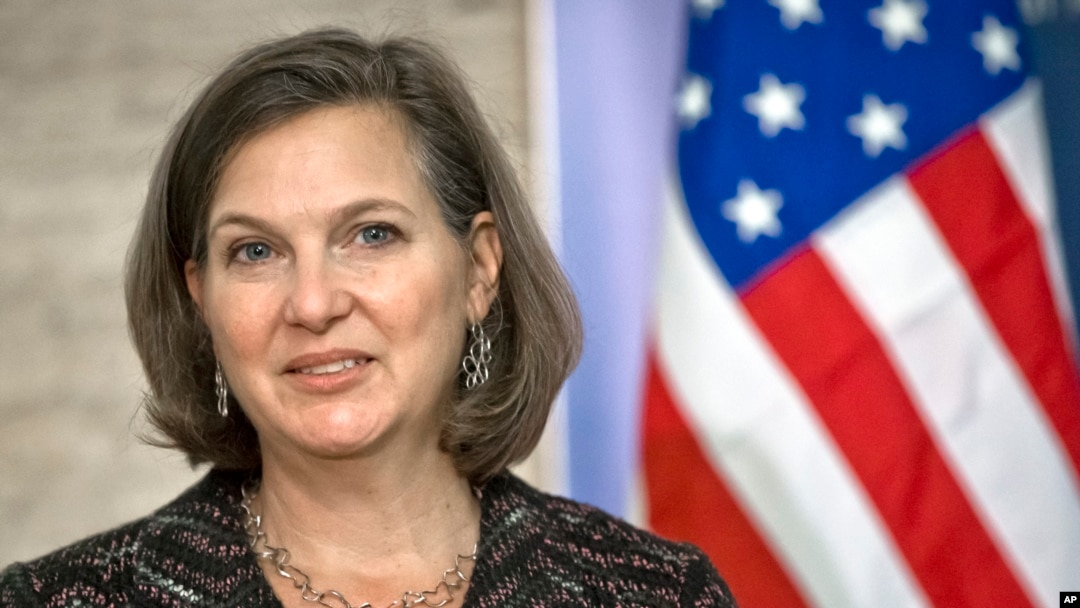The United States says Western sanctions against Moscow for its intervention in Ukraine are having a significant effect on the Russian economy. But some members of Congress voiced their skepticism Thursday and called on the Obama administration to impose even stiffer sanctions, especially if Russia undermines Ukraine's national election set for May 25.
The U.S. State Department's chief European diplomat, Victoria Nuland, told a congressional hearing that the sanctions imposed by the U.S. and its European allies against Russia are weighing heavily on its economy, with its stock market dropping and the value of its currency, the ruble, falling.
"The Russian economy ... is already buckling under the pressure of these internationally imposed sanctions. Its credit ratings are hovering just above junk status," said Nuland.
House Foreign Affairs Committee Chairman Ed Royce acknowledged that the sanctions are having an effect, but he said Russian President Vladimir Putin seems to have calculated that "the price will be bearable."
Royce called for stiffer sanctions, especially if Russia disrupts Ukraine's presidential election.
"We must stop reacting to Putin's moves, while waiting patiently for the Europeans to join us," he said. "Instead, we must adopt a proactive strategy that will convince President Putin that his aggression will have a significant and lasting cost to the Russian economy, and ultimately to his rule, should he intervene in that election."
Several lawmakers, including Ted Poe, a Texas Republican, said they are not convinced the sanctions are having much of an effect.
"I don't think it's worked," he said. "In all fairness, I don't think it's stopped Russia from doing anything."
Although Putin on Wednesday said Russian troops massed on the Ukraine border have pulled back, Nuland said the U.S. has seen no evidence of that. Nuland said the U.S. is working with its European allies about the possibility of imposing sanctions on specific parts of the Russian economy, such as the crucial energy sector.
European Union foreign ministers are set to discuss new sanctions Monday in Brussels. But some European leaders have been reluctant to punish Moscow too deeply because European trade deals with Russia are more extensive than those between the U.S. and Russia.
The U.S. State Department's chief European diplomat, Victoria Nuland, told a congressional hearing that the sanctions imposed by the U.S. and its European allies against Russia are weighing heavily on its economy, with its stock market dropping and the value of its currency, the ruble, falling.
"The Russian economy ... is already buckling under the pressure of these internationally imposed sanctions. Its credit ratings are hovering just above junk status," said Nuland.
House Foreign Affairs Committee Chairman Ed Royce acknowledged that the sanctions are having an effect, but he said Russian President Vladimir Putin seems to have calculated that "the price will be bearable."
Royce called for stiffer sanctions, especially if Russia disrupts Ukraine's presidential election.
"We must stop reacting to Putin's moves, while waiting patiently for the Europeans to join us," he said. "Instead, we must adopt a proactive strategy that will convince President Putin that his aggression will have a significant and lasting cost to the Russian economy, and ultimately to his rule, should he intervene in that election."
Several lawmakers, including Ted Poe, a Texas Republican, said they are not convinced the sanctions are having much of an effect.
"I don't think it's worked," he said. "In all fairness, I don't think it's stopped Russia from doing anything."
Although Putin on Wednesday said Russian troops massed on the Ukraine border have pulled back, Nuland said the U.S. has seen no evidence of that. Nuland said the U.S. is working with its European allies about the possibility of imposing sanctions on specific parts of the Russian economy, such as the crucial energy sector.
European Union foreign ministers are set to discuss new sanctions Monday in Brussels. But some European leaders have been reluctant to punish Moscow too deeply because European trade deals with Russia are more extensive than those between the U.S. and Russia.




